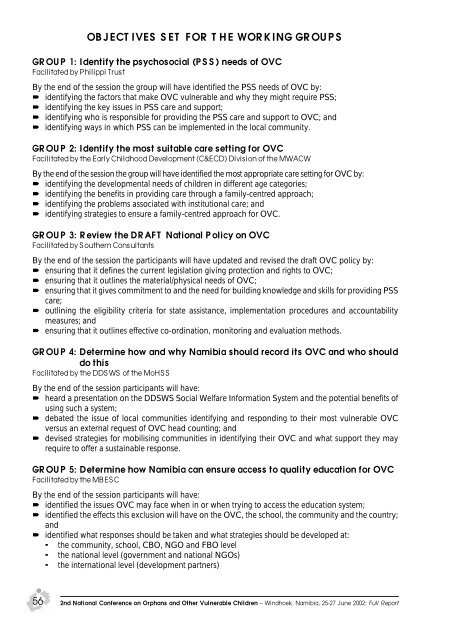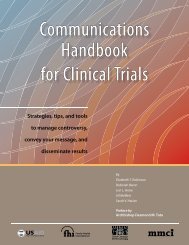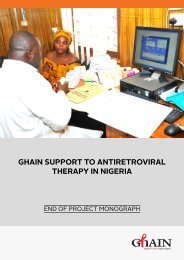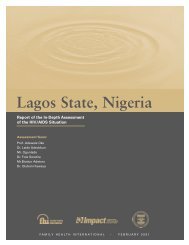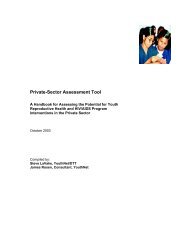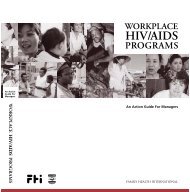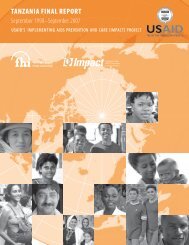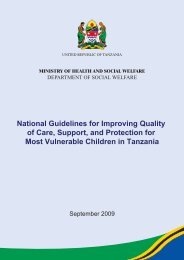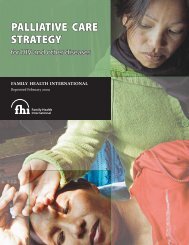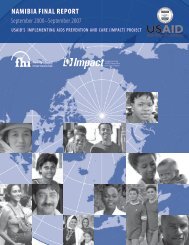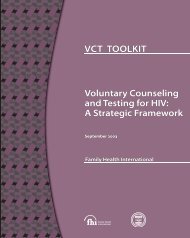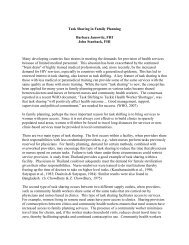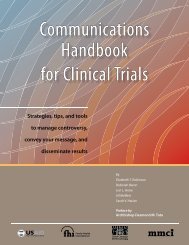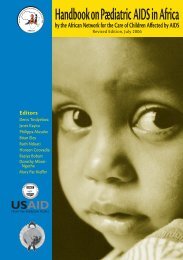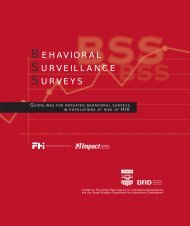2nd National Conference on Orphans and Other ... - FHI 360
2nd National Conference on Orphans and Other ... - FHI 360
2nd National Conference on Orphans and Other ... - FHI 360
Create successful ePaper yourself
Turn your PDF publications into a flip-book with our unique Google optimized e-Paper software.
OBJECTIVES SET FOR THE WORKING GROUPS<br />
GROUP 1: Identify the psychosocial (PSS) needs of OVC<br />
Facilitated by Philippi Trust<br />
By the end of the sessi<strong>on</strong> the group will have identified the PSS needs of OVC by:<br />
identifying the factors that make OVC vulnerable <strong>and</strong> why they might require PSS;<br />
identifying the key issues in PSS care <strong>and</strong> support;<br />
identifying who is resp<strong>on</strong>sible for providing the PSS care <strong>and</strong> support to OVC; <strong>and</strong><br />
identifying ways in which PSS can be implemented in the local community.<br />
GROUP 2: Identify the most suitable care setting for OVC<br />
Facilitated by the Early Childhood Development (C&ECD) Divisi<strong>on</strong> of the MWACW<br />
By the end of the sessi<strong>on</strong> the group will have identified the most appropriate care setting for OVC by:<br />
identifying the developmental needs of children in different age categories;<br />
identifying the benefits in providing care through a family-centred approach;<br />
identifying the problems associated with instituti<strong>on</strong>al care; <strong>and</strong><br />
identifying strategies to ensure a family-centred approach for OVC.<br />
GROUP 3: Review the DRAFT <str<strong>on</strong>g>Nati<strong>on</strong>al</str<strong>on</strong>g> Policy <strong>on</strong> OVC<br />
Facilitated by Southern C<strong>on</strong>sultants<br />
By the end of the sessi<strong>on</strong> the participants will have updated <strong>and</strong> revised the draft OVC policy by:<br />
ensuring that it defines the current legislati<strong>on</strong> giving protecti<strong>on</strong> <strong>and</strong> rights to OVC;<br />
ensuring that it outlines the material/physical needs of OVC;<br />
ensuring that it gives commitment to <strong>and</strong> the need for building knowledge <strong>and</strong> skills for providing PSS<br />
care;<br />
outlining the eligibility criteria for state assistance, implementati<strong>on</strong> procedures <strong>and</strong> accountability<br />
measures; <strong>and</strong><br />
ensuring that it outlines effective co-ordinati<strong>on</strong>, m<strong>on</strong>itoring <strong>and</strong> evaluati<strong>on</strong> methods.<br />
GROUP 4: Determine how <strong>and</strong> why Namibia should record its OVC <strong>and</strong> who should<br />
do this<br />
Facilitated by the DDSWS of the MoHSS<br />
By the end of the sessi<strong>on</strong> participants will have:<br />
heard a presentati<strong>on</strong> <strong>on</strong> the DDSWS Social Welfare Informati<strong>on</strong> System <strong>and</strong> the potential benefits of<br />
using such a system;<br />
debated the issue of local communities identifying <strong>and</strong> resp<strong>on</strong>ding to their most vulnerable OVC<br />
versus an external request of OVC head counting; <strong>and</strong><br />
devised strategies for mobilising communities in identifying their OVC <strong>and</strong> what support they may<br />
require to offer a sustainable resp<strong>on</strong>se.<br />
GROUP 5: Determine how Namibia can ensure access to quality educati<strong>on</strong> for OVC<br />
Facilitated by the MBESC<br />
By the end of the sessi<strong>on</strong> participants will have:<br />
identified the issues OVC may face when in or when trying to access the educati<strong>on</strong> system;<br />
identified the effects this exclusi<strong>on</strong> will have <strong>on</strong> the OVC, the school, the community <strong>and</strong> the country;<br />
<strong>and</strong><br />
identified what resp<strong>on</strong>ses should be taken <strong>and</strong> what strategies should be developed at:<br />
the community, school, CBO, NGO <strong>and</strong> FBO level<br />
the nati<strong>on</strong>al level (government <strong>and</strong> nati<strong>on</strong>al NGOs)<br />
the internati<strong>on</strong>al level (development partners)<br />
56 <str<strong>on</strong>g>2nd</str<strong>on</strong>g> <str<strong>on</strong>g>Nati<strong>on</strong>al</str<strong>on</strong>g> <str<strong>on</strong>g>C<strong>on</strong>ference</str<strong>on</strong>g> <strong>on</strong> <strong>Orphans</strong> <strong>and</strong> <strong>Other</strong> Vulnerable Children – Windhoek, Namibia, 25-27 June 2002: Full Report


